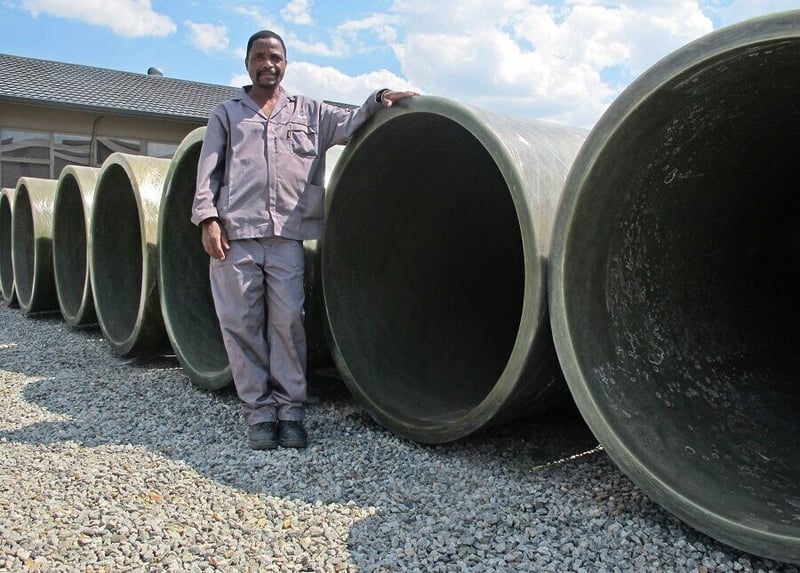Stop Massive Municipal Water Loss with GRP Pipes
Written by: Nissin Save to Instapaper
Nearly 40% of South Africa’s municipal water is lost before ever reaching customers, according to the Water Research Commission (WRC). This equates to approximately 1,580-million cubic metres of lost water per annum in a country considered “water-scarce”, or an estimated R7 billion in lost revenue.
Says Roger Rusch, CEO of Industrial Water Cooling (IWC), “Over 25% of the 36.8% in municipal water loss is due to pipe leakages caused by corrosion or poor jointing. For this reason, local governments should consider replacing old steel or asbestos cement pipes with ones constructed out of glass fibre reinforced plastic (GRP). Unlike steel or asbestos, GRP does not corrode and the joints are leak-proof when installed correctly.
“GRP pipes not only minimize the chances of leaks, but also deliver better energy savings on pumping due to their minimal pressure losses and optimal flowrates.”
Municipal pipeline routes frequently follow roads and are often located in the vicinity of power lines, which significantly corrodes steel or ductile iron pipes unless adequate protection measures, such as costly cathodic protection systems, are installed. Steel and ductile iron pipelines constructed parallel to power lines require ground mats to be installed during construction to prevent the development of dangerously high voltages and currents.
“GRP is a non-conductive composite material, meaning GRP pipelines can be installed almost anywhere, alongside roads or power lines. In contrast to steel and iron, with GRP, municipalities don’t need to worry about costly maintenance and corrosion-prevention measures.” concludes Rusch.
Get new press articles by email
139 Press Release Articles
Nissin Laby is a Web PRO and SEO specialist working at Hot Salsa Media, South Africa
Latest from
- Are You Up for the Fast-Action-Packed Momentum-Multiply Adventure Challenge
- First Car Rental Extends its World-Class Show&Go Facilities
- Hank McGregor Named KZN Sportsman of the Year
- McGregor Shortlisted for Double KZN Sports Awards
- McGregor Nominated for World Paddle Awards' Sportsman of the Year
- Jeep Team's OCR Warriors Represent South Africa at 2015 OCR World Championships
- Jeep Team's Dodd and Dolman Crowned SA's BMX Champions
- Jeep Team's Dylan Rebello Wins Tour de Plett
- First Car Rental Joins Sabre Travel Marketplace
- Top 10 Finish for Jeep Team's McGregor and Lewin at ICF Ocean Racing World Championships
- Jeep Team's McGregor Wins Downwind Surfski Series Opener
- Jeep Team’s Van Tonder and D'oliveira Selected for SA OCR World Champs Team
- First Car Rental Nominated for Prestigious 2015 Business Traveller Africa Award
- Top 10 Fusion Restaurants in South Africa
- Jeep Team’s Smith and Redelinghuys Win World’s Toughest Single Stage MTB Race
The Pulse Latest Articles
- Beyond The Pit: Why Mining Partnerships Are Being Redefined (March 2, 2026)
- A Refreshing Reset For Your Tastebuds (March 2, 2026)
- Celebrating 125 Years Of Hansgrohe: Setting The Beat Of Water Since 1901 (February 25, 2026)
- Celebrate Pokémon Day At Toys R Us Menlyn On 28 Feb (February 25, 2026)
- The Great Generational Handover: Why South Africa’s Middle Managers Are The Hinge Of 2026 (February 23, 2026)
